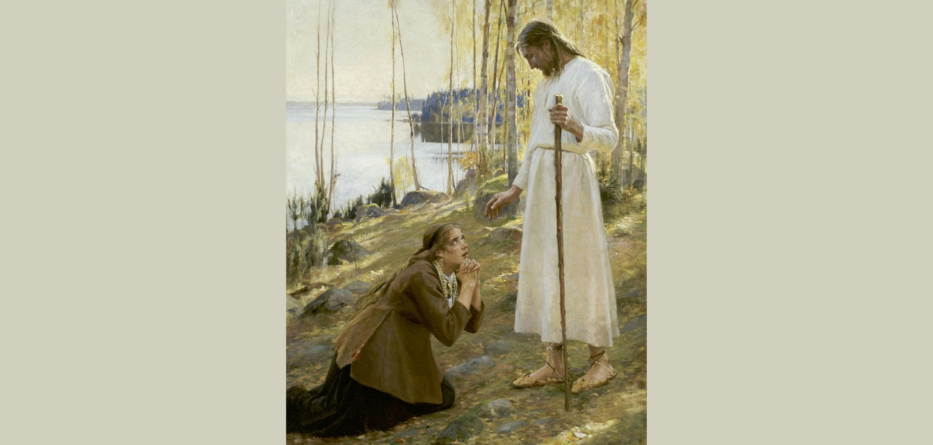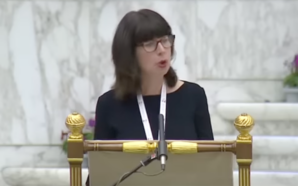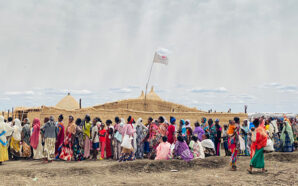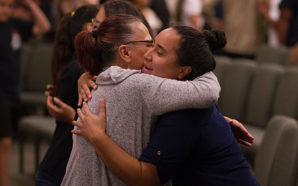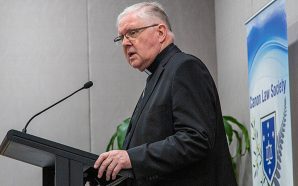2nd Sunday of Easter
Sunday of Divine Mercy
24 April 2022
Readings: Acts 5:12-16; Ps 118:2-4, 13-15, 22-24 ; Rev 1:9-11a, 12-13, 17-19; John 20:19-31
In today’s gospel, the Risen Jesus invites Thomas to place his hand into Jesus’ side. And this comes just a week after Jesus had told Mary of Magdala not to cling to him. What’s going on here? One is told not to cling; another is commanded to do so. One hears a prohibition; and the other an injunction.
Listen at https://soundcloud.com/frank-brennan-6/homily-24422
For us Christians, Easter is a time for the unalloyed sharing of our Easter hope and joy, regardless of the state of our world or of our minds. We gather with our different voices, our different experiences, and our different perceptions of the risen Lord.
In the scene immediately preceding today’s gospel, we encounter Mary of Magdala who thought he was the gardener. The Jesuit poet Peter Steele once observed that this was a happy mistake. She thought he was the gardener and he was. Jesus utters those words to her as he does to us: ‘Do not cling to me. Don’t cling to those old forms; don’t cling to those old ways; don’t think that it’s all going to be the same as it has been all those years in the past.’ In our post-COVID church we should be hearing that message loud and clear as we prepare for the next phase of our Plenary Council.
Mary of Magdala is commissioned to go find his brothers and give them the news. We are then told in today’s gospel about the disciples who have gathered in the upper room; they’re locked into the room out of fear. To these disciples comes the message: ‘Peace be with you. I am sending you. Receive the Holy Spirit.’ As Pope Francis says, Jesus ‘does not bring a peace that removes the problems without, but one that infuses trust within. It is no outward peace, but peace of heart.’[1]
Thomas ‘one of the Twelve’ is absent. We’re not told why. We know why Judas was absent, but not why Thomas was. Thomas may have had a legitimate reason for his absence; but then again he might not. He may have been something of a rebel or a loner. We thank God that Thomas was absent. It’s his absence that provides an opportunity to witness another instance of the presence of the Risen Lord.
A week later, on Sunday, the Lord’s Day, they gathered together, as we do, again and this time Thomas is with the other disciples demanding practical proof, realistic pointers, and real contact with the risen Lord. Some of us like Mary of Magdala encounter the Lord telling us not to cling to that which we hold dear. Others of us like Thomas are demanding practical proof so that we might change our ways.
The scripture scholar Dorothy Lee writes: ‘Whereas Magdalene tends to be portrayed as the helpless dependent woman who seeks Jesus but foolishly misses her cues, Thomas is the doubter whose faith needs a sledgehammer to move it.’ Lee goes on to say: ‘Magdalene is not a weak helpless woman moving blindly from one misapprehension to another; nor is Thomas a pessimistic character prone to existential doubt.’[2] Happily in the midst of all those like Magdalene, and those like Thomas, and most of us like the disciples in the upper room simply gathered together afraid about what is out there in an ever changing world, reaching out to people, we hear the message: ‘Doubt no longer but believe. Happy are they who have not seen and yet believe. Happy are they who do not cling and yet believe. Happy are those locked in fear in the upper room, who hear the commission of peace’. And then: ‘I send you forth filled with the Spirit to forgive and reconcile the world, humanity and each other.’
Together we celebrate the ordinariness of Easter joy and hope. Pope Francis says, ‘The disciples realized that they had been shown mercy: they realized that God did not condemn or demean them, but instead believed in them. God, in fact, believes in us even more than we believe in ourselves. “He loves us better than we love ourselves.” (cf. Saint John Henry Newman, Meditations and Devotions, III, 12, 2)’[3]
At Newman College, we happily have just published the latest book of Peter Steele’s poetry entitled Raining Angels. The book contains a series of poems which are reflections on key verses of scripture. His poem Gardener reflects the Risen Jesus’ encounter with Mary of Magdala:[4]
If it were England, and later in the day,
she might have met him, faded shirt,
scuffed leggings and all, partly shadowed
by long allees at, say, Chiswick –
everything turned to vista, seeking out
the Statue of Cain and Abel, the Domed
Building, the Rustic Arch, the Doric Column
Topped by Venus, the Bagnio,
the Obelisk, and the Deer House, and the rest.
As it was, the heart gone out of her with grief,
she picked her way through scrubby bushes,
expecting nothing but the nothing left
when love’s pegged up for the sun to eat.
It was peculiar, then, to round a rock
and find some idler, hands pinked
by spiky work, but the rest of him at ease,
liking the morning, nestling a crocus,
his wide mouth practiced about her name.
We thank God for the idler with pinked spicy hands, at ease with us, with wide mouth that has practised the name of each of us whether telling us not to cling or inviting us to place our hand in his side. On this Sunday of Divine Mercy, we recall Pope Francis’ reflection: ‘The peace of Jesus made the disciples pass from remorse to mission. The peace of Jesus awakens mission. It entails not ease and comfort, but the challenge to break out of ourselves. The peace of Jesus frees from the self-absorption that paralyzes; it shatters the bonds that keep the heart imprisoned.’ [5] Let’s walk free in this Easter season. Let’s embrace the new possibilities for us as Church emerging from the pandemic and preparing for the next phase of our Plenary Council. Let’s be free enough to follow the prohibition not to cling and the injunction to walk free.
[1] Pope Francis, Homily, Feast of Divine Mercy, 11 April 2021, available at https://www.vatican.va/content/francesco/en/homilies/2021/documents/papa-francesco_20210411_omelia-divinamisericordia.html
[2] Dorothy Lee, ‘Partnership in Easter Faith: The Role of Mary Magdalene and Thomas in John 20’, Journal for the Study of the New Testament, (1995) Vol.17 (58), pp.37-8, 49
[3] Pope Francis, Homily, Feast of Divine Mercy, 11 April 2021
[4] Peter Steele, Raining Angels, Newman College, 2021, p. 73
[5] Pope Francis, Homily, Feast of Divine Mercy, 11 April 2021
Fr Frank Brennan SJ is the Rector of Newman College, Melbourne, and the former CEO of Catholic Social Services Australia (CSSA). He has been appointed a peritus at the Fifth Plenary Council of the Australian Catholic Church.




